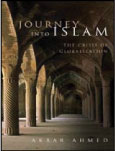“Journey into Islam”
By Craig Considine
Washington, DC
 On
January 28th, 2007, the Hebrew Congregation of Washington,
DC welcomed Professor Akbar Ahmed to participate in the Amram
Scholar series to discuss his forthcoming book Journey into
Islam: The Crisis of Globalization. The morning’s event
was attended by ambassadors, rabbi’s, priests, and other
diplomats and distinguished guest to learn more about Islam
in the 21st century.
On
January 28th, 2007, the Hebrew Congregation of Washington,
DC welcomed Professor Akbar Ahmed to participate in the Amram
Scholar series to discuss his forthcoming book Journey into
Islam: The Crisis of Globalization. The morning’s event
was attended by ambassadors, rabbi’s, priests, and other
diplomats and distinguished guest to learn more about Islam
in the 21st century.
Senior Rabbi Bruce Lustig of the Congregation welcomed Professor
Ahmed and emphasized the necessity to build bridges to reconstruct
a functional and peaceful relationship between members of
the Abrahamic tradition.
Professor Ahmed stated that this event “was like coming
to his own congregation” because of his many friends
there. He said that a spiritual and pragmatic awakening was
essential to heal the wounds between both Jews and Muslims.
In his extraordinary journey throughout the Islamic world,
Professor Ahmed met with many Muslims, including religious
leaders and presidents, from all walks of life to discover
how globalization has shaped the Islamic world.
Journey into Islam resulted from a study cosponsored by the
Brooking Institute, the Pew Forum, and American University.
Professor Ahmed and his team took a global approach in figuring
out how globalization has impacted numerous Islamic societies
around the world. He journeyed to nine countries that were
comprised of Pakistan, India, Indonesia, Malaysia, Turkey,
Egypt, Qatar, Jordan and Syria.
This examination of Islam in the 21st century involved meeting
President Musharraf of Pakistan, several Prime Ministers,
Muslim students, Muslim religious leaders, along with other
regular Muslims from around the world. Professor Ahmed and
his team got a first-hand look at the views that Muslims are
sharing surrounding ideas like the relationship with the West,
globalization, contemporary role models, greatest problems
within the Muslim world, and solutions to help end conflicts
and to build bridges to ensure a safe and prosperous future.
The study also examined ways in which it has changed the West
and the growing importance for political, social and religious
leaders to have dialogue to mend these exacerbated differences.
Professor Ahmed began this discussion by reflecting upon his
own personal recollection of the events on 9/11. While teaching
a class at the American University, the enormity of the morning
sunk in on Professor Ahmed as he realized that what had transpired
was a forbidden act within the Islamic faith. The result of
the events of 9/11 made it ever more important for the world’s
religions to better understand each other. As the events of
9/11 unfolded, Professor Ahmed realized that he was facing
the greatest challenge of his illustrious career: to create
understanding between Islam and the rest of the world.
On this vast research trip, Professor Ahmed saw anti-Americanism
and anti-Semitism at the highest level that he had ever seen.
In attending different mosques and madrassahs, Professor Ahmed
and his team heard Muslims in the Middle East and in Southeast
Asia blame non-Muslims for the occurrence of 9/11. On the
contrary, Professor Ahmed believes that Islam was hijacked
and that 9/11 was “an event by people who defaced Islam.”
He pointed out that much of the world feels simultaneously
under siege including the Muslim world — in Palestine,
in Chechnya, in Iraq and Afghanistan. He concluded that Islam
is a religion that is tolerant and compassionate by nature
and is a religion that emphasizes the search for knowledge
more so than it does with the use of violence. Professor Ahmed
noted a saying of the Prophet Muhammad, “The ink of
the scholar is more sacred than the blood of the martyr.”
Islam is a religion that emphasizes knowledge and justice,
not violence and hatred of Jews and Christians.
Professor Ahmed returned from his journey with a fresh sense
of hope. Through his unique experiences with citizens of various
Muslim countries, he believed that the common ground for dialogue
indeed exists. The importance of this dialogue, however, will
play an ever growing role on the world stage. The Muslim population,
as Professor Ahmed noted, “is not going anywhere –
understanding is not a luxury.” Professor Ahmed told
the crowd of Jewish practitioners at the Congregation that
“each one of us must address and accept the invitation
and challenge to heal the fractured world.”
A frequent statement issued by Professor Ahmed at the discussion
was “if not now, when?” The building of relationships
with Jews and Christians is a first step in healing the problems
of the world. Building relationships, as Rabbi Lustig made
note of, is the stepping stone for peace between members of
the Abrahamic tradition. Both Professor Ahmed and Rabbi Lustig
emphasized the necessity for Jews and Muslims to convey the
message that there is hope to heal the wounds. Rabbi Lustig
concluded the morning’s events by suggesting that all
who attended the scholar series event should take with them
the ideas of tolerance and compassion. He specifically asked
the Jewish community that he represents to understand the
necessity for dialogue and understanding to take place. He
believes that it is the obligation of Jews, Muslims and Christians
to reverse the negative relationship between some members
of the Abrahamic tradition that lies in the minds of the people.
Many scholars and practitioners alike have concluded that
the clash of civilizations within the Abrahamic tradition
is “one solely in our minds” as Professor Ahmed
noted. The future is now and we can shape its course only
if we work together. The clash of civilizations occurs only
if we allow it to do so, Rabbi Lustig concluded.
-------------------------------------------------------------------------------------

